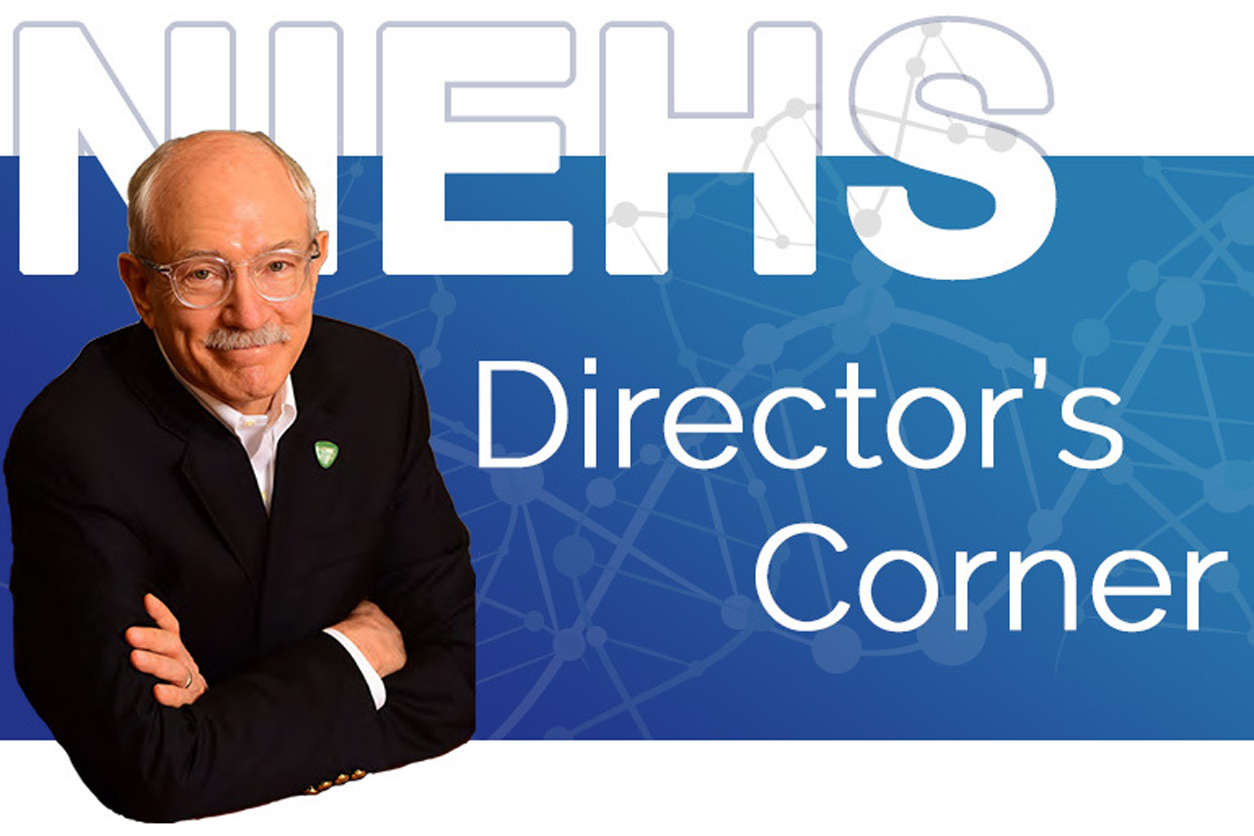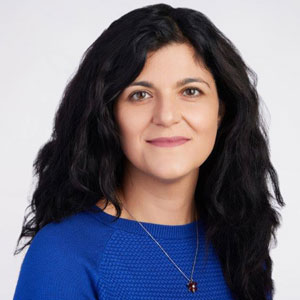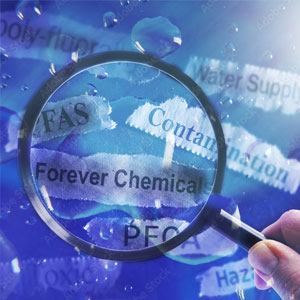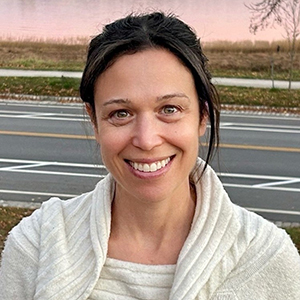
Regular readers of this column know that one of my goals is to advance exposomics — the study of the totality of our environmental exposures and their corresponding biological effects. Each day, we are exposed to not just one chemical at a time but rather many different substances, and how they can interact to influence health outcomes deserves greater research attention. At the same time, we should bear in mind that certain exposures — to nutritious food, exercise, and green spaces, for example — can deliver amazing health benefits and may counter the effects of some contaminants. That is why I believe it is important to balance our public health messaging to accentuate the positive when possible, and to empower people to take control of their health.
NIEHS grant recipient Emily Oken, M.D., M.P.H., is a renowned physician-scientist from Harvard Medical School who has sought to achieve that balance throughout her 22-year career. She studies how diet and environmental exposures during pregnancy can affect health outcomes in children, with more than 500 publications to date. Among her other efforts, Dr. Oken has worked to understand the benefits and risks of fish consumption during pregnancy, uncover how exposure to PFAS affects obesity, and develop effective ways to share findings with patients.
In May, she gave an NIEHS Keystone Science Lecture that described her research into fish consumption during pregnancy, a topic that has garnered significant attention due to concerns about methylmercury exposure. It turns out that just as not all environmental exposures are bad for our health, certainly not all fish consumption is bad during pregnancy, and in fact is often of great benefit to the mother and her baby. Dr. Oken has been able to successfully communicate the nuances of research on this topic, and I think her experience offers valuable lessons for the environmental health sciences community. When we can find ways to share our science using positive messages, we are more likely to inspire individuals to be proactive about their health instead of resigned that poor health outcomes are inevitable.
Recently, I caught up with Dr. Oken to learn more about her research, her approach to science communication, and what inspired her to become a physician and epidemiologist. Excerpts of our in-depth conversation are provided below.
Omega-3 fatty acids and pregnancy
Rick Woychik: What have you learned about diet during pregnancy, specifically fish consumption and the resulting intake of things like omega-3 fatty acids?
Emily Oken: We know that there are benefits of omega-3 fatty acids during pregnancy, and those have been shown in randomized clinical trials and observational studies. The clear benefit is in reducing risk of preterm birth — that seems to be the benefit with the most evidence.

Also, a benefit for which there is mixed evidence is enhanced offspring cognition and behavior. I use the word mixed because we have not seen such developmental benefits in randomized trials involving supplements, but there are a few potential reasons for that. One is that you may need to start early — most nutritional intervention trials tend to begin at mid pregnancy, and maybe it is an early exposure or even preconception that matters. Another option is that with fish, people may need the whole package — not just the omega-3 fatty acids but also all of the other stuff in the fish. And a third possibility is that the observational studies are potentially confounded by healthy behaviors on the part of pregnant mothers.
In addition to reducing risk of preterm birth and potentially improving offspring cognition and behavior, there is additional evidence around allergy prevention. There seems to be strong evidence that pregnant mothers’ consumption of omega-3 fatty acids can help to prevent food allergies in their children, for example. All in all, there are strong reasons to ensure adequate omega-3 fatty acid status during pregnancy
Eating fish versus taking supplements
RW: Does it matter whether the omega-3s come directly from eating fish or whether they come from supplements?
EO: Ideally it comes from fish, which seems to be the best dietary source. Fish are safe and generally low in contaminants, and there are a range of types to choose from. For me, a big advantage of eating fish is that you have had a meal and you have gotten protein. With supplements, you still need to eat food.
The advice is generally to eat a variety of fish rather than sticking with one type alone. If you want the best results, ideally you will eat fish high in good fats and omega-3s such as salmon and trout, and small fish like sardines and mackerel. There are a lot of other options. A good low-cost option that is now covered by WIC [Women, Infants and Children Program] is farmed salmon, which is healthy and safe for people to eat.
Regarding supplements, a lot of people take them, and a lot of prenatal vitamins have a little bit of omega-3 fatty acids. We have seen that pregnant women who see the most benefit from supplements had low baseline intake of omega-3s. Another thing to consider is that almost all omega-3 supplements are completely safe — no substantial harm has been shown to come from them, even at very high doses.
A big research gap regarding diet and pregnancy is well, if you do not eat fish, what do you substitute it with? Are you having a salad with tofu, chicken breast, maybe a burger? We do not know what direction women may be going in.
Strengthening public health messages
RW: What are your thoughts on how we can communicate better with women about fish consumption and other environmental exposures to improve pregnancy outcomes?
EO: With environmental exposures, it can be tricky because we want to provide awareness while avoiding panic. Regarding fish consumption, if we say that mercury is in fish and mercury is bad, or arsenic is in fish and arsenic is bad, it turns out that we cannot generalize that to then say eating fish is bad. That is because we have to consider the whole package, so to speak, because there are all kinds of other stuff in a fish. We have now seen in dozens of studies where people may eat a couple servings of fish per week, or maybe even a little more, that there is no evidence of harm.
When we communicate risk, we need to share the nuances. It is not that a fish has mercury and mercury is bad, so therefore do not eat the fish. It may be that the fish has mercury, mercury may be bad, but you can still eat other fish lower in mercury. Or we might try to say that on balance, fish is good, so if you want to keep eating it, do so, and here are some suggestions.
I have found that if we tell people what not to do, they get scared away. It is better to adopt a proactive approach and provide messages about what to do. Besides, when you just tell someone what to avoid, they may not know what exactly to substitute.
Also, I should add that there is a lot of trust in turning to healthcare providers for advice, but many providers do not get good education on environmental health. They get most of what they learn from the newspaper and other media outlets just like the public. I do not think that we in the environmental health sciences community have done the best job to partner with physicians and other providers to develop clear messages that can be shared with patients and the public.
Diet influences effects of PFAS
RW: As you know, many in the environmental health sciences community are moving toward an exposomics approach, where the goal is to examine traditional exposures like mercury and air pollution but also things like psychosocial stress and lifestyle factors, including diet. What are your thoughts on moving to that kind of broad exposomics approach?
EO: I endorse exposomics, and there has been an effort by me and my colleagues to think more deeply about interactions between nutrition and the environment. We have done some work on nutrition and stress, and nutrition and environmental factors, and we definitely see that these exposures matter in combination.
One example would be our NIEHS-funded work with the Diabetes Prevention Program trial, which involved a study of adults at high risk of diabetes who were followed over time. We found that certain levels of PFAS measured in study participants’ blood were associated with increased weight, glucose levels, and diabetes risk.
The advantage of this study is that it was a randomized trial, and one segment of the cohort received a diet and lifestyle intervention. Interestingly, those who were in the intervention arm of the study saw no harm from high PFAS levels, whereas those with an unhealthy lifestyle did experience the negative health outcomes I just mentioned. Going forward, we want to dive deeper into the specific dietary factors that influence health effects of PFAS exposure.
I have a wonderful team, and our work is never done by me alone. In fact, it is mostly done by my early-career colleagues and collaborators. Working with them every day is truly rewarding.
(Rick Woychik, Ph.D., directs NIEHS and the National Toxicology Program.)









